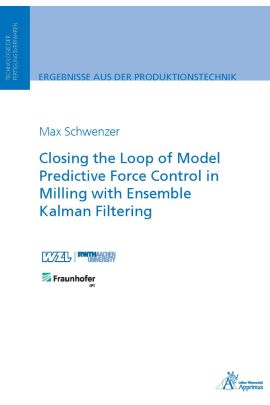The thesis describes the continuous adaptation of a model in a model predictive force controller (MPFC) and thus enables a truly adaptive, optimal manufacturing process at its technological limit and an increase in workpiece quality.
In milling, the force determines productivity, quality, and safety. Fast-changing engagement conditions between tool and workpiece provoke abrupt changes in the force causing classic, reactive control to fail. Model-based predictive control (MPC). Avoids such failure by anticipating the process behavior on the basis of a process model.
MPC for force control in milling requires an online identification of a process model. The state-of-the-art identification method is a repeated curve fit over larger intervals, essentially opening the force control loop in the meantime. The results of these curve fits are uncorrelated and have to be smoothed in order to produce a mathematically continuous feedback signal to avoid instability of the controller. For the identification, the presented work introduces a recursive method based on a particle filter known as ensemble Kalman filter (EnKF).
The system is tested against a conventionally designed process with constant feed, as well as against previous implementations of a MPFC in milling. The contribution to the state of the research are first and foremost robustness as well as the ability to permanently close the feedback loop via the EnKF. The advantage to state-of-the-industry solutions is the reduction of the manufacturing time by 40 - 60 % compared to a process with constant feed.
| Autor | Schwenzer, Max |
|---|---|
| Gewicht | 0.329 kg |
| Erscheinungsdatum | 11.04.2022 |
Technologie der Fertigungsverfahren
Closing the Loop of Model Predictive Force Control in Milling with Ensemble Kalman Filtering
Kurzbeschreibung
The dynamics of the milling process put a challenge on controlling its force. Model-based predictive control (MPC) anticipates the immediate process behavior and reacts in time. The presented work introduces a particle filter known as ensemble KALMAN filter (EnKF) for the crucial online identification of the process model. This enables an adaptive, optimal manufacturing process at its technological limit drastically reducing the manufacturing time while guaranteeing geometric quality.

